How To Hire an Offshore Development Team For Delivering Your Project Successfully
7 August, 2023
In the rapidly evolving digital landscape, businesses strive to maintain a competitive edge and optimize their productivity.
Hiring an offshore software development team has emerged as a highly effective strategy in achieving these goals.
Nonetheless, the process of identifying the perfect team from a vast array of choices can be quite daunting. Businesses encounter the intricate challenge of carefully evaluating various factors to ensure that the selected team perfectly aligns with their needs and overarching goals.
In this in-depth guide, we’ll take you through everything you need to know about how to hire an offshore software development team that will help bring your business into 2023 and beyond!
From identifying your needs to selecting the perfect candidates and managing your project effectively – we’ve got it all covered. So buckle up and get ready for a comprehensive journey on how to find top-notch talent overseas!
What is an Offshore Team?
‘Offshoring’ is a type of ‘outsourcing’, where a company outsources workload to companies or teams that are located overseas.
An offshore software development team, in essence, is the process of hiring a team outside of one’s home country and assigning them the task of building software.
Countries like Pakistan, India, Bangladesh, and the Eastern European region are the leading destinations to outsource software development.
While the European countries may seem like an attractive option in terms of their work quality, the cost is far higher than in developing countries like Pakistan and India.
They collaborate with clients through various communication channels, ensuring seamless project execution and the delivery of high-quality software solutions.
With a compound annual growth rate (CAGR) of 10.13% between 2022 and 2030, it is predicted that the market for offshore software development would rise to a value of USD 283,457.5 million by the year 2030.
Offshore software development has become increasingly popular due to its numerous benefits, including cost-effectiveness, access to a diverse talent pool, and round-the-clock development capabilities.
Why are Offshore Development Teams in Demand?
Offshore development teams are in high demand due to several compelling reasons. Here are the key factors that contribute to the popularity and increased demand for offshore development teams
Cost-effectiveness:
One of the primary reasons for the popularity of offshore development teams is cost-effectiveness.
Offshore outsourcing allows companies to access skilled software professionals at a lower cost compared to hiring local talent. Offshore locations often offer competitive labor rates, enabling businesses to significantly reduce their development costs while maintaining quality.
Access to a diverse talent pool:
Offshore development teams provide access to a diverse talent pool with a wide range of skills and expertise.
Companies can tap into global talent markets, allowing them to find and engage professionals who possess specific technical skills or industry knowledge that may be scarce or expensive locally.
This enables businesses to build highly specialized teams tailored to their project requirements.
Scalability and flexibility:
Offshore development teams offer scalability and flexibility that can be crucial for businesses.
Companies can easily scale their teams up or down based on project demands, without the need for extensive recruitment or downsizing processes.
This agility allows organizations to quickly respond to market fluctuations and seize new opportunities.
Round-the-clock development capabilities:
Offshore development teams located in different time zones provide the advantage of round-the-clock development capabilities.
This means that work can progress continuously, as the software offshore team can continue development tasks when the onshore team is offline.
This accelerated development cycle helps reduce time-to-market and enables faster product delivery.
Expanded operational hours:
Offshore software teams can extend the operational hours of a company.
With teams in different time zones, businesses can ensure that development, maintenance, and support activities are carried out even outside regular working hours.
This expanded coverage improves customer service and support, leading to enhanced customer satisfaction.
Focus on core competencies:
Outsourcing an offshore dev team allows companies to focus on their core competencies. By delegating development tasks to offshore experts, organizations can free up their internal resources to concentrate on strategic business initiatives, innovation, and market expansion.
Accelerated innovation and expertise sharing:
Offshore development teams bring diverse perspectives, industry knowledge, and innovative ideas to the table.
Collaborating with professionals from different cultural backgrounds and work environments fosters creativity and accelerates innovation.
Moreover, knowledge sharing between onshore and offshore teams enhances the overall expertise within the organization.
Reduced time and effort for recruitment:
Building an in-house development team requires significant time and effort to attract, recruit, and train personnel.
Offshore development teams eliminate the need for extensive recruitment processes, as they are already equipped with the necessary skills and experience. This saves valuable time and resources, allowing businesses to start development projects promptly.
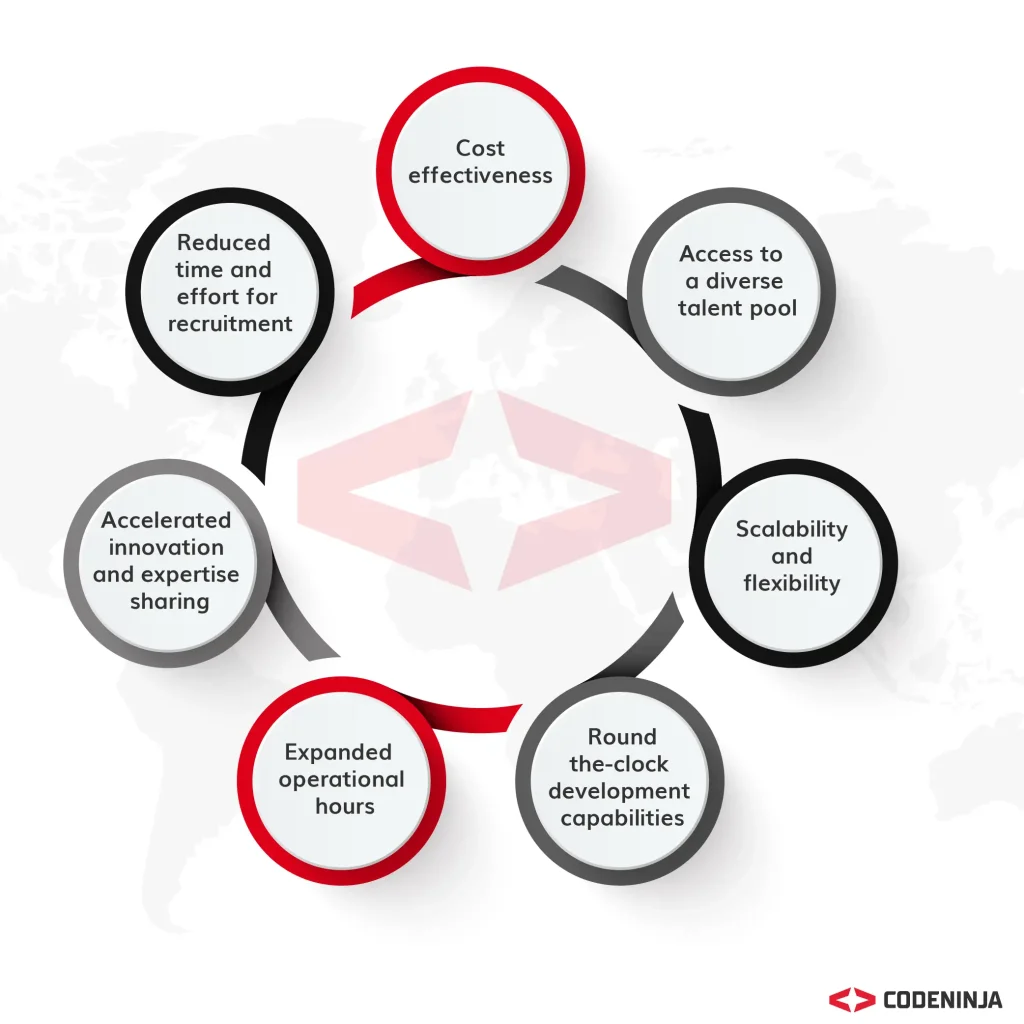
Offshore Development Team Members
An offshore software development team structure consists of highly skilled professionals who collaborate remotely to design, develop, and deliver software solutions for clients located in different regions or countries.
The team structure typically includes a range of team members and roles, each with specific responsibilities and expertise. These roles may include:
- Project managers
- Software developers
- Quality assurance engineers
- UI/UX designers
- Database administrators
- Technical support specialists
The offshore development model enables teams to operate across different time zones, enabling continuous development and support services.
Robust communication channels, including video conferencing, instant messaging, and project management tools, foster effective collaboration among team members.
This well-structured offshore team setup is strategically designed to optimize efficiency, boost productivity, and ensure seamless coordination, resulting in the successful execution of software projects and the delivery of top-notch solutions.
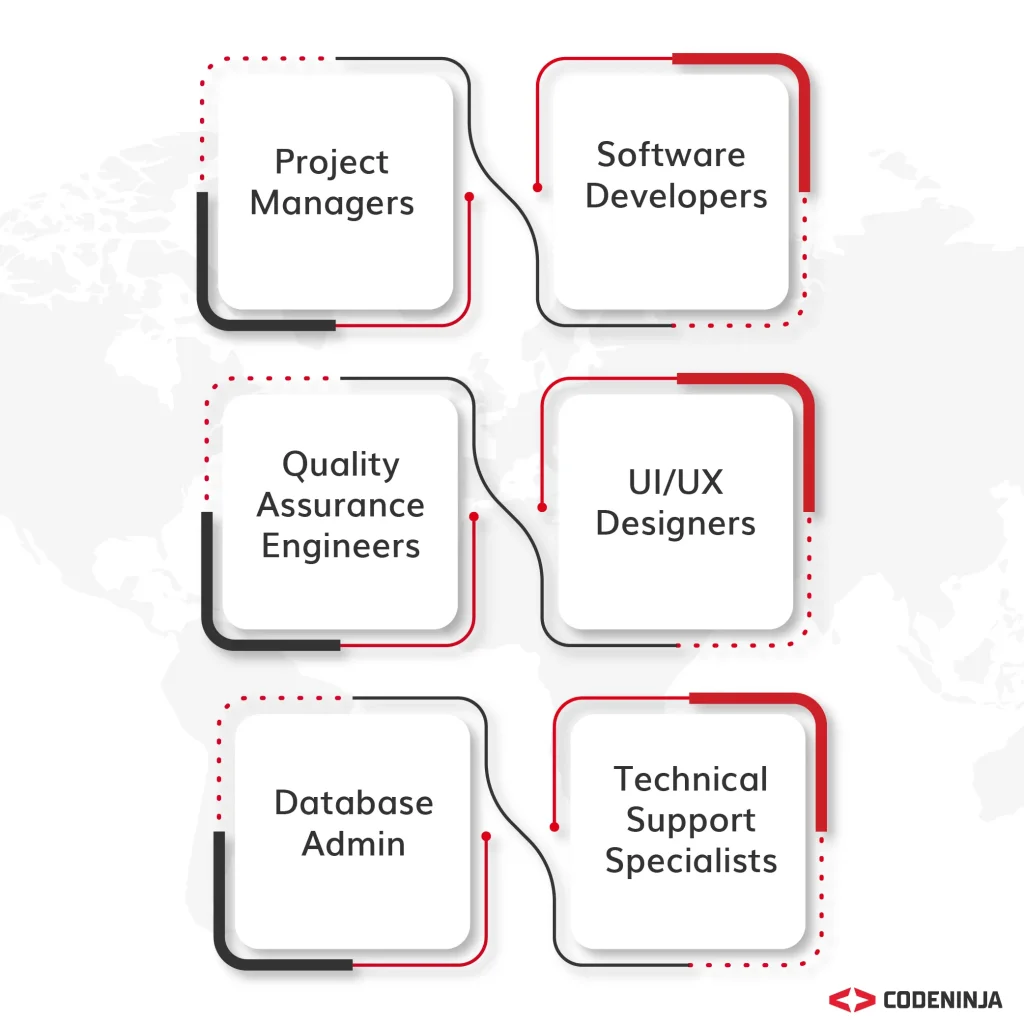
Offshore vs Onshore - What is The Difference Between Onshore and Offshore
Offshore Software Development Teams:
These teams are primarily located in a different country or region than the company that hires them. More often, they are located at a location that has a significant time difference from the home country of the hiring company.
These teams provide software development services to the hiring company in a remote model.
The main differences with offshore teams include language and cultural barriers, time zone differences, and potential challenges in communication and coordination.
However, offshore teams often offer cost advantages, access to a diverse talent pool, and round-the-clock development capabilities.
Nearshore Software Development Teams:
Nearshore software development teams are situated in neighboring or nearby countries, sharing similar time zones and geographical proximity with the client company. This proximity minimizes language and cultural differences and facilitates easier collaboration.
Nearshore teams offer advantages such as reduced travel time and costs, improved communication, and increased cultural compatibility.
Additionally, nearshore teams often provide cost savings compared to onshore teams while maintaining a similar level of quality.
Onshore Software Development Teams:
Onshore software development teams are located within the same country or region as the client company. They work in close proximity, facilitating seamless communication, cultural alignment, and face-to-face collaboration.
Onshore teams are advantageous when projects require real-time interaction, strict compliance with local regulations, or when confidentiality and intellectual property protection are critical concerns.
Onshore teams offer the benefits of shared language, culture, and business practices, but they may be more expensive compared to offshore or nearshore options.
Onshore vs Nearshore vs Offshore
Difficult to Choose Between In-house Team or Offshore Team?
Determining whether to opt for an in-house development team or an offshore development team poses a significant decision-making challenge for businesses.
Each choice presents its own set of benefits and considerations, making it crucial to carefully assess various factors to determine the most suitable fit for specific needs and requirements.
Advantages of In-house Development Team
- Accelerated Speed: In-house teams enable faster project initiation and execution, allowing you to launch your initiatives more swiftly and respond promptly to market demands.
- Increased Flexibility: With an in-house team, you have the flexibility to scale resources and adapt to evolving business needs without relying on external dependencies.
- Control and Customization: Having an in-house team grants you complete control over the development process, allowing for customization and tailored solutions that align precisely with your needs and preferences.
- Strengthened Security Measures: Keeping development activities within your organization enhances data security and reduces the potential risks associated with sharing sensitive information with external parties.
- Cultural Cohesion: Building a team that shares your company’s values and culture promotes a harmonious working environment, encourages collaboration, and nurtures a sense of belonging, resulting in increased productivity and satisfaction.
Disadvantages of an In-House Development Team:
- Cost Considerations: Building and managing an in-house development team can entail significant financial investments, including recruitment, salaries, benefits, and infrastructure costs.
- Time-Consuming Recruitment: Finding and training skilled individuals for your team can be a time-consuming process, requiring diligent efforts to identify the right talent fit for your specific requirements.
- Risk Factors: There is inherent risk involved in relying solely on an in-house team, as their performance and capabilities may not always align with your expectations or deliver the desired outcomes.
- Expertise Limitations: In-house teams may lack the specialized expertise required for complex or niche software development projects, necessitating additional resources or external partnerships.
- Communication Challenges: Effective communication with an in-house team can be challenging, particularly when dealing with geographical or time zone differences, which may impede seamless collaboration and coordination.
Advantages of Offshoring Software Development Team
Advantages of Offshore Team:
- Cost-Effectiveness: Offshoring software development offers significant cost savings due to lower labor costs in offshore locations, allowing you to achieve more within your budget.
- Access to Skilled Talent: Offshore locations provide access to a vast pool of skilled software developers, enabling you to find professionals with the specific expertise and experience required for your projects.
- Accelerated Development Process: Offshoring software development can expedite project timelines as offshore teams often faceless resource competition, enabling faster delivery and time-to-market.
- Enhanced Flexibility: Working with an offshore team in a different time zone allows for increased flexibility, ensuring continuous progress on your projects, even outside regular business hours.
Cons of Offshore Development Team
- Communication Challenges: Overcoming time zone differences and cultural nuances can pose communication challenges when collaborating with an offshore team, potentially leading to delays or misinterpretations.
- Quality Control: Maintaining the same level of control over the development process and ensuring consistent quality can be challenging when working with an offshore team.
- Security Risks: Entrusting your intellectual property to an offshore team carries inherent security risks, necessitating proper safeguards and agreements to mitigate the potential for data breaches or unauthorized access.
- Trust Concerns: Establishing and maintaining trust with an offshore team may require additional effort, as there can be uncertainties about their reliability and ability to deliver on commitments.
Who Needs to Hire Offshore Development Team?
Startups and Small Businesss
Startups and small businesses often turn to offshore teams to overcome budget constraints while gaining access to a global talent pool.
They can leverage the cost-effectiveness and scalability offered by offshore teams to build and scale their software products.
Enterprises
Established enterprises seeking to expand their development capabilities or accelerate time-to-market can also benefit from offshore teams.
These teams provide the flexibility to quickly ramp up resources, execute development projects efficiently, and tap into specialized expertise.
Companies with Large-scale Projects
Companies with complex or large-scale projects that require round-the-clock development and support can leverage offshore teams located in different time zones to ensure uninterrupted progress.
Ultimately, any organization seeking cost-effective development solutions, access to specialized skills, scalability, and flexibility can consider hiring an offshore development team to meet their software development needs.
When Should You Hire an Offshore Software Development Team?
Hiring an offshore software development team is an option that businesses should consider in specific situations.
To augment the existing team’s capabilities:
One key scenario is when there is a need to augment the existing in-house team’s capabilities. Offshore teams can provide additional resources, specialized expertise, and scalability to handle complex projects or meet demanding deadlines.
To scale rapidly:
When rapid scaling is required, offshore development teams offer a valuable solution. These teams enable businesses to expand their operations swiftly and effectively, providing the necessary resources to initiate and accelerate projects promptly.
With their expertise and capabilities, offshore development teams contribute to a seamless launch and efficient progress, empowering businesses to meet their growth objectives with agility.
To attain cost-efficiency:
Opting for offshore development teams presents an opportunity to optimize software development costs effectively. These teams often offer competitive rates compared to in-house counterparts, allowing businesses to allocate their resources more efficiently.
To gain access to specialized skills:
Engaging offshore development teams offers the advantage of accessing specialized skills that may not be readily available in-house. This becomes particularly valuable when undertaking intricate or groundbreaking projects.
Offshore teams often possess expertise in diverse domains, including emerging technologies and industry-specific knowledge, enabling them to tackle complex challenges with precision.
To work with a team that is located in a different time zone:
The time zone difference allows for round-the-clock work, enabling tasks to be completed while you’re away. This seamless workflow ensures that your project remains in motion, resulting in increased efficiency and faster turnaround times.
By leveraging the time zone difference, businesses can achieve optimal productivity and accelerate project timelines, ultimately leading to successful and timely delivery.
How To Find Offshore Development Team?
During the first quarter of 2022, investors in North America injected a substantial amount of $82.8 billion into early-stage startups. In 2023, this figure experienced an 11% decline compared to the previous quarter, yet it remained the fourth-highest total ever recorded for a quarter.
Given the prevailing economic downturn, securing investments now requires additional effort. Startup founders should exercise increased caution regarding their expenses and prioritize profitability as their primary objective.
In this context, hiring offshore development teams presents an excellent opportunity for startup founders. By hiring offshore software developers, they can carry on developing their software products despite the ongoing economic challenges.
Looking For Offshore Development Team Here are the Steps To Find an Offshore Team
Assess Your Startup’s Requirements and Needs
The initial step involves carefully evaluating the specific requirements of your startup. This includes several factors, such as the nature of your project, the target country, and the desired collaboration model.
For instance, if your focus is on backend development, you’ll need a proficient Node.js developer.
However, for the creation of a comprehensive cloud solution, assembling a team of multidisciplinary experts becomes essential.
Next, it is crucial to determine whether you would prefer partnering with developers from Eastern Europe, considering their cultural similarities with Western countries.
Alternatively, you might explore collaboration opportunities with offshore companies in Latin America.
Additionally, invest time in contemplating the most suitable collaboration model for your startup.
Would a fixed-price arrangement be advantageous, or would you prefer a time and material-based pricing structure?
Carefully consider these options to make an informed decision.
Conduct Research about offshore locations and Prepare A Shortlist
Conduct thorough research to identify offshore locations known for their robust technology ecosystems and a pool of skilled software developers. Consider factors such as language proficiency, cultural compatibility, political stability, and time zone differences.
Below are the three most common ways to research offshore software development teams:
#1 Use tech company directories:
To find offshore software development teams using company directories, utilize reputable tech company directories such as Clutch, G2, Upcity, ITFirms, and Goodfirms.
These directories allow you to refine your search based on specific expertise areas, enabling you to find companies that align with your requirements. One notable advantage of these directories is their emphasis on verified reviews, which can provide valuable insights.
#2 Use freelancing platforms
Using freelance platforms like Fiverr and Upwork can be a viable option when searching for offshore software development teams. These platforms are popular among businesses with smaller projects or limited budgets.
However, it’s important to consider the drawbacks of working with freelancers, such as increased costs when using intermediaries like Toptal or potential issues with reliability and security.
#3 Work with software development agencies directly
When it comes to finding an offshore software development team, working with established software development agencies is the most favorable and low-risk option.
These agencies provide comprehensive services to meet all your technical requirements. They prioritize effective project management, ensuring the team is manageable and communicative, and offer streamlined processes that are transparent and reliable. Having a designated point of contact throughout the project ensures smooth coordination and successful achievement of project milestones.
Evaluate the shortlisted companies
Evaluation of the shortlisted companies is the most essential step. Here are multiple ways to go about it:
- Review the company portfolios and expertise:
Review the portfolios, case studies, and client testimonials of the shortlisted offshore teams to assess their experience, expertise, and the types of projects they have delivered. Look for teams that have successfully executed projects similar to yours
- Seek recommendations and referrals:
Reach out to professional networks, industry colleagues, or trusted sources for recommendations and referrals. Their experiences and insights can help you evaluate the service quality of the company.
- Assess technical skills and communication capabilities:
Evaluate the technical skills of the offshore team by reviewing their qualifications, certifications, and past projects. Additionally, assess their communication capabilities, including proficiency in English and their ability to effectively communicate and collaborate remotely.
- Conduct interviews and due diligence:
Schedule interviews with the shortlisted offshore teams to evaluate their understanding of your project, their proposed approach, and their ability to meet your requirements. Ask for references and contact their previous clients to gather feedback on their performance and professionalism.
Consider cultural fit and working style:
Cultural fit and working style are crucial for successful collaboration. Assess the cultural compatibility between your organization and the offshore team to ensure smooth communication and effective teamwork.
Legal and contractual considerations:
Before finalizing an offshore team, ensure that all legal and contractual aspects are addressed. Establish agreements that define project scope, deliverables, timelines, pricing, intellectual property rights, confidentiality, and dispute resolution mechanisms.
Get Started with CodeNinja
With CodeNinja, hiring offshore developers has never been easier. CodeNinja Consulting is a leading offshore development services provider with a strong track record of delivering high-quality solutions to clients across the globe.
Where To Find Offshore Development Team? Best Regions and Countries For Offshoring
People often ask where to find offshore development team.
According to industry analysis and expert opinions, several nations consistently rank among the top choices. We’ve listed down the best place to hire an offshore development team:
The list is organized by region, along with the ongoing trends, advantages, and kinds of software services that are being offshored to the region.
Eastern Europe For Hire an Offshore Team
Eastern Europe has established itself as a prominent hub for offshore development, with countries like Ukraine, Belarus, and Poland gaining international recognition.
Developers from this region possess extensive expertise and are well-versed in various programming languages.
For instance, Ukrainian web engineers exhibit strong proficiency in Java, JavaScript, and Python.
In Poland, PHP is the predominant programming language, closely followed by Java and .NET.
Moreover, it’s worth noting that offshore specialists in Eastern Europe typically charge an hourly rate ranging between $25 and $40.
This competitive pricing, combined with their technical prowess, makes Eastern Europe an attractive destination for offshore development projects.
Asia Region For Hiring Offshore Team
When it comes to offshore web development, Pakistan and India are often the preferred choices for many companies.
The primary factor that attracts businesses is the comparatively lower rates, typically ranging from $18 to $25 per hour. This cost advantage makes partnering with Pakistani and Indian specialists an enticing option.
However, it is crucial to acknowledge that there is one significant drawback to consider – ensuring the desired quality can be challenging.
While Asia offers cost-effective solutions, maintaining consistent quality standards can sometimes be a hurdle. It is important to thoroughly assess and communicate your quality expectations to ensure a successful partnership with Indian web development teams.
Latin America For Hiring Offshore Software Development Teams
Latin America is currently witnessing remarkable growth in the software development industry, with offshore development hubs located in countries like Argentina, Mexico, and Brazil.
This region offers promising opportunities for businesses seeking offshore software development services.
The hourly rate for programmers there usually ranges from $30 to $50 per hour, depending on the level of experience and skill set possessed by the engineers.
This competitive pricing, combined with the region’s growing talent pool, makes Latin America an appealing destination for companies looking to outsource their software development needs.
How To Hire Offshore Development Team?
#1 Define Objectives and Develop an Action Plan
The initial step is to thoroughly analyze your goals and create a comprehensive action plan. It is crucial to explicitly identify the specific challenges that your initial Minimum Viable Product (MVP) aims to resolve.
This clarity is essential when onboarding external engineers, as they need a clear understanding of these issues. Determine the primary objective of your product and consider breaking it down into more manageable stages.
Setting deadlines for each stage helps establish a clear timeline for development and ensures efficient progress. By mapping out your goals and creating a well-defined action plan, you lay a solid foundation for the successful execution of your project.
#2 Establish Key Selection Criteria for Candidates (Portfolio, Price, Skills)
Prior to starting the hiring process, it is important to develop a clear profile of your ideal team. Determine the specific factors that you will consider when evaluating potential candidates.
It is highly recommended to prioritize assessing their work experience, portfolio, track record of successful projects, and comprehensive evaluation of their soft and hard skills.
By establishing these key selection criteria, you ensure a more effective and informed decision-making process, allowing you to identify candidates who possess the necessary qualifications and capabilities to contribute to your team’s success.
#3 Craft a Thoughtful Questionnaire
To conduct a thorough evaluation, it is highly beneficial to prepare a well-designed set of interview questions. This carefully curated questionnaire should encompass all the essential segments that require assessment. By utilizing a pre-determined set of questions, you can ensure that all critical requirements are thoroughly addressed and evaluated.
#4 Identify potential offshore teams
Seek recommendations, browse online directories, and attend industry events to identify potential offshore software development teams. Evaluate their expertise, experience, and portfolios to ensure they align with your project requirements.
#5 Assess team capabilities
Conduct interviews or virtual meetings with shortlisted offshore teams to evaluate their technical skills, communication capabilities, and cultural fit. Discuss their development processes, tools, and methodologies to ensure they align with your preferences.
#6 Check client references and testimonials
Request client references from the offshore teams and reach out to their previous clients to gather feedback on their performance, reliability, and professionalism. This will provide insights into their track record and client satisfaction.
#7 Choose a Team and Finalize the Contract
After carefully selecting a suitable candidate, the next step is to initiate collaboration by signing a contractual agreement.
This step should be treated with utmost seriousness as it holds significant importance in the hiring process.
The contract serves as a formal acknowledgment of the agreement between you and the selected team. It outlines the terms, expectations, and responsibilities of both parties, ensuring clarity and transparency throughout the working relationship.
Prioritize the contract as a vital component of the hiring process to establish a solid foundation for a successful partnership with the team.
#8 Start with a small pilot project and keep track of the offshore team’s progress
Consider starting with a smaller pilot project to assess the offshore team’s capabilities, collaboration processes, and quality of work. This allows you to evaluate their performance before committing to a long-term partnership.
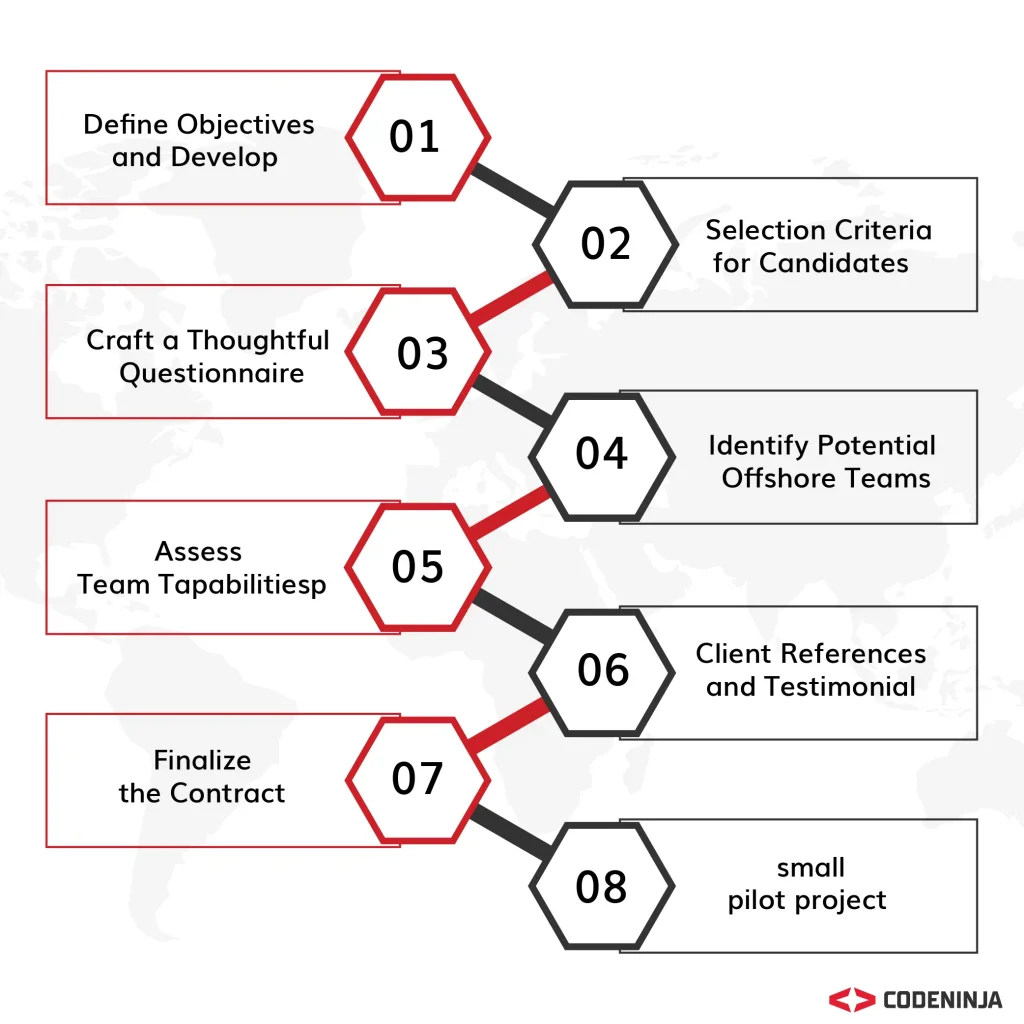
Effective Strategies to Manage an Offshore Development Team
By following these steps, you can effectively establish and manage an offshore software development team, leveraging their expertise to deliver high-quality software solutions while capitalizing on the benefits of offshore outsourcing.
Seek Out the Perfect Talent
One of the key factors in achieving success is identifying the right talent for your business.
It is important to have a deep understanding of your company’s requirements, the nature of your product, and the technical infrastructure supporting it.
Effectively translating project needs into technology requirements is essential.
To simplify the process of finding suitable talent, it is important for management to be aligned right from the beginning regarding the specific skills needed.
Elaborate on Priorities and Objectives
When it comes to identifying an offshore team that aligns with your goals, it is important to establish precise demands and criteria.
Prioritization becomes a key skill in this process. Take the time to define a clear set of priorities and be explicit about your requirements throughout the entire selection process.
By setting expectations upfront, you can significantly reduce the time spent on adjustments and clarifications later on.
This proactive approach ensures a more efficient and focused collaboration with the offshore team, streamlining the overall development process.
Establish effective communication channels:
Communication is crucial for successful collaboration. Set up regular meetings, leverage communication tools such as video conferencing and instant messaging, and establish clear channels for reporting progress, addressing concerns, and exchanging feedback.
Ensure intellectual property protection:
To safeguard intellectual property (IP), it is essential to prioritize its protection through the establishment of legally binding agreements.
This includes the implementation of non-disclosure agreements (NDAs) and intellectual property rights (IPR) agreements, ensuring that sensitive information and proprietary assets are adequately secured.
Clearly define ownership rights and confidentiality clauses to safeguard your proprietary information.
Foster a collaborative work environment:
Encourage a collaborative work environment by fostering trust and building strong relationships with the offshore team. Promote open communication, encourage knowledge sharing, and organize team-building activities to strengthen the bond between onshore and offshore team members.
Prioritize the Improvement of Working Conditions:
To address talent gaps and retain skilled employees, it is essential to concentrate on improving working conditions.
Managing a constantly changing development team can be time-consuming and costly. By enhancing the work environment, offering professional development opportunities, training, and fair compensation, you can build a competent offshore team.
Prioritizing the well-being of your employees creates a desirable workplace and supports long-term growth and success.
Implement effective project management practices:
Adopt agile project management methodologies to enhance flexibility and adaptability throughout the development lifecycle. Use project management tools to track progress, manage tasks, and ensure timely delivery of milestones.
Conduct regular quality assurance and testing:
Giving utmost importance to quality assurance and testing is crucial to ensure that the software meets the desired standards.
It is essential to establish a robust and comprehensive testing process, encompassing unit testing, integration testing, and user acceptance testing.
This rigorous testing approach enables the identification and resolution of any bugs or issues, guaranteeing a high-quality end product.
Monitor performance and provide feedback:
Continuously monitor the performance of the offshore team and provide constructive feedback to improve their work. Regularly assess project progress, adherence to deadlines, and overall quality to ensure project success.
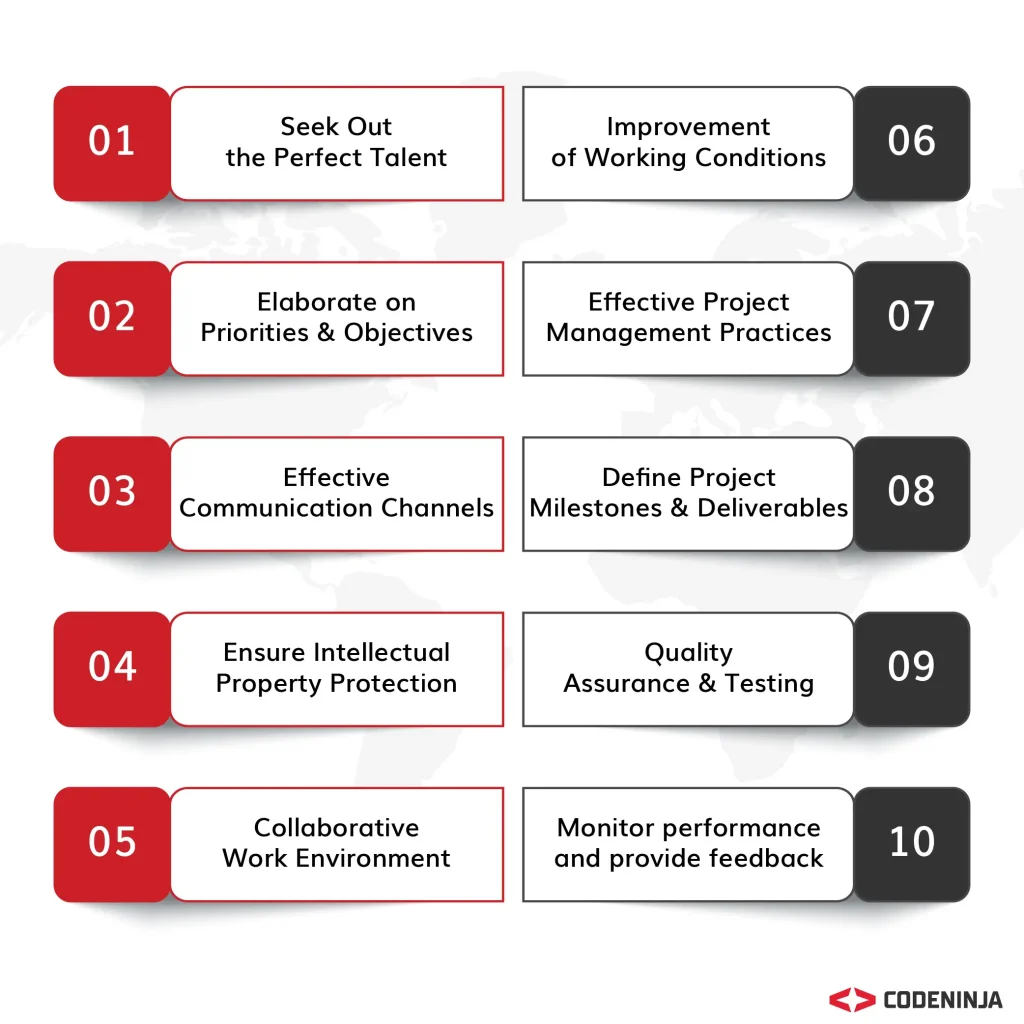
Offshoring Development Team Problems and Solutions
When hiring offshore teams or working with an offshore development team, there are several common challenges that you may encounter. To ensure successful management and mitigation of these hurdles, it is crucial to have a comprehensive understanding of the challenges at hand.
Overcoming Communication and Language Barriers: Variations in language skills and cultural subtleties can potentially impede effective communication and result in misinterpretations.
Time zone differences:
Working across different time zones can affect real-time collaboration and timely communication.
Scheduling meetings and resolving urgent issues may require careful coordination and flexibility to accommodate the time differences.
Cultural differences:
Cultural variations in work styles, business practices, and communication norms can impact team dynamics and project execution.
Building cultural understanding, promoting cultural sensitivity, and fostering an inclusive work environment can help overcome these challenges.
Quality control and monitoring:
Ensuring consistent quality standards and effectively monitoring the progress of offshore teams can be challenging due to geographical distances.
Implementing robust quality control processes, establishing key performance indicators (KPIs), and utilizing project management tools can help address this challenge.
Legal and contractual issues:
Navigating the legal aspects related to intellectual property rights, data protection, and compliance with local regulations can be complex and pose challenges.
To address these issues effectively, it is essential to establish clear and well-defined legal agreements and contracts.
Seeking guidance from legal experts when necessary can provide valuable insights and ensure proactive measures are taken to address any legal considerations that may arise.
Team integration and collaboration:
Integrating an offshore team with an existing in-house team and fostering collaboration across different locations can be a challenge.
Encouraging teamwork, organizing virtual team-building activities, and utilizing collaboration tools can help bridge the distance and foster a cohesive work environment.
Project management and coordination:
Coordinating tasks, managing dependencies, and aligning project timelines across different teams and locations require effective project management practices.
Adopting agile methodologies, utilizing project management tools, and ensuring transparent communication can mitigate this challenge.
By being aware of these common challenges and risks of offshore development, you can proactively address them and set up strategies to mitigate offshore problems.
Effective communication, cultural understanding, strong project management practices, and a collaborative mindset are key to successfully navigating these challenges and building a productive relationship with offshore teams.
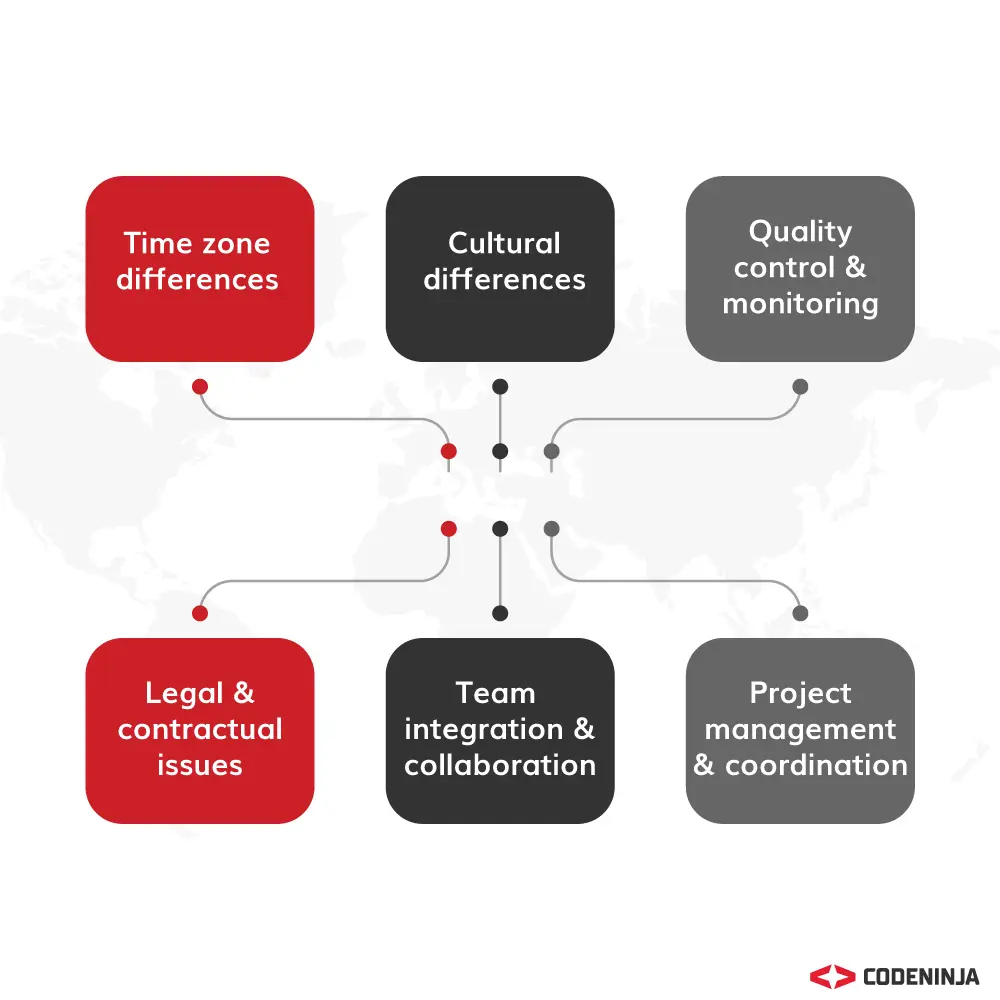
How Do You Ensure The Quality of Work Delivered By an Offshore Team?
How to check offshore development team quality is a commonly asked question.
To guarantee the excellence of deliverables provided by a software development team located offshore, it is paramount to implement essential approaches that contribute to achieving top-notch results. Below are some key strategies:
Establish clear project requirements:
Clearly define project requirements, including functional and non-functional specifications, design guidelines, and performance expectations. Providing comprehensive documentation and clarifying any ambiguities upfront will help the offshore team understand and meet your expectations.
Implement robust quality assurance processes:
Establishing a thorough quality assurance (QA) process is essential, encompassing multiple testing stages like unit testing, integration testing, system testing, and user acceptance testing.
By creating comprehensive test cases, conducting regular code reviews, and utilizing automated testing tools, organizations can effectively detect and resolve any issues or bugs that may arise, ensuring the delivery of high-quality software solutions.
Maintain open and frequent communication:
Establish effective communication channels with the offshore team to facilitate ongoing collaboration and feedback. Regularly communicate project updates, address any concerns promptly, and encourage open dialogue to ensure a shared understanding of quality standards.
Conduct thorough code reviews:
Regular code reviews by the offshore team and an internal technical lead can help identify and rectify any coding errors, adhere to coding standards, and maintain overall code quality. This process enables knowledge sharing, identifies potential vulnerabilities, and ensures code consistency.
Monitor progress and milestones:
Set clear project milestones and monitor progress against them. Utilize project management tools to track tasks, timelines, and deliverables. Regularly review progress with the offshore team, address any delays or bottlenecks promptly, and ensure alignment with project goals.
Foster knowledge sharing and continuous improvement:
Encourage the offshore team to share their expertise, innovative ideas, and best practices. Foster a culture of continuous learning and improvement by organizing regular knowledge-sharing sessions, conducting training programs, and promoting cross-team collaboration.
Conduct periodic quality audits:
Periodically assess the overall quality of work delivered by the offshore team through independent quality audits. These audits can evaluate adherence to coding standards, scalability, performance, security, and overall compliance with project requirements.
Establish service-level agreements (SLAs):
Define clear SLAs with the offshore team, specifying quality-related metrics, such as defect rates, response times, and resolution times. Regularly monitor and evaluate performance against these SLAs to ensure accountability and continuous improvement.
By implementing these strategies, you can ensure the quality of work delivered by an offshore software development team. Effective communication, robust quality assurance processes, continuous monitoring, and a collaborative mindset are key to maintaining high standards and achieving successful project outcomes.
How Do You Ensure Cultural Compatibility when Working With an Offshore Development Team?
When working with offshore development teams, ensuring cultural compatibility is crucial for fostering effective collaboration and achieving project success. Here are some strategies to promote cultural compatibility:
Promote cultural awareness and understanding
Encourage team members to learn about each other’s cultures, traditions, and work practices.
Provide resources or organize cultural awareness sessions to facilitate a deeper understanding of diverse perspectives, communication styles, and work etiquette.
Establish open and inclusive communication channels
Create an environment that encourages open communication and respects diverse viewpoints. Foster a culture where team members feel comfortable expressing their opinions, asking questions, and seeking clarification.
Leverage communication tools that facilitate real-time interaction and help bridge the geographical and cultural gaps.
Define and align expectations
Clearly define and communicate expectations regarding work hours, response times, and communication protocols to ensure alignment across different time zones and cultural contexts.
Establish guidelines for meeting etiquette, collaboration tools, and preferred modes of communication to avoid misunderstandings.
Embrace diversity in problem-solving approaches
Recognize and appreciate diverse problem-solving approaches and perspectives. Encourage team members to share their unique ideas, approaches, and solutions.
Emphasize the value of collaboration and learning from different cultural backgrounds to foster innovation and creativity.
Build relationships and trust
Invest time and effort in building relationships and trust with the offshore team members. Organize virtual team-building activities, informal social interactions, or knowledge-sharing sessions to foster a sense of camaraderie and trust.
Encourage both onshore and offshore team members to interact and collaborate beyond work-related discussions.
Adapt to cultural nuances:
Be mindful of cultural nuances, such as greetings, preferred communication styles, and decision-making processes.
Adapt your communication approach to accommodate different cultural norms and practices. Respect and appreciate diverse perspectives, and be open to adjusting your own expectations and assumptions.
Resolve conflicts constructively
In a multicultural team, conflicts may arise due to varying cultural backgrounds and work styles. Encourage open and respectful discussions to address conflicts promptly.
Foster a problem-solving mindset, seek common ground, and leverage mediation techniques if necessary to ensure conflicts are resolved in a constructive manner.
By actively promoting cultural awareness, fostering open communication, and embracing diversity, you can ensure cultural compatibility when working with an offshore software development team.
Building a collaborative and inclusive work environment will enhance team cohesion, improve productivity, and contribute to successful project outcomes.
build a long-term relationship with an offshore software development team?
Fostering trust and cultivating a lasting partnership with a software development team based offshore is pivotal in fostering fruitful cooperation and ensuring enduring accomplishments for the project. Here are some essential tactics to accomplish this objective:
Clear communication
Foster open and transparent communication channels with the offshore team. Clearly communicate project goals, expectations, and timelines.
Encourage regular video conferences, virtual meetings, and real-time messaging platforms to facilitate seamless communication and quick issue resolution.
Shared goals and vision
Establish a shared sense of purpose and align the offshore team with your organization’s goals and vision. Clearly articulate the project’s objectives and how their contributions fit into the bigger picture.
This helps create a sense of ownership, commitment, and motivation among team members.
Regular interaction and collaboration
Foster a collaborative work environment by facilitating regular interaction and collaboration between onshore and offshore team members.
Encourage knowledge sharing, brainstorming sessions, and cross-team collaboration to leverage the diverse expertise and perspectives. This promotes a sense of unity and mutual respect.
Establish clear expectations
Define clear expectations regarding project deliverables, quality standards, and deadlines. Communicate specific requirements and milestones to ensure a shared understanding.
Regularly monitor progress and provide feedback to ensure alignment and address any issues promptly.
Emphasize trust-building activities
Invest in trust-building activities to strengthen the relationship with the offshore team.
This can include organizing team-building exercises, virtual social events, or cultural exchange programs. Encourage informal interactions to foster personal connections and build rapport.
Recognition and appreciation
Recognize and appreciate the contributions of the offshore team. Celebrate milestones and achievements, both individually and as a team.
Regularly acknowledge their efforts and provide positive feedback to foster a positive work environment.
Address challenges proactively
When challenges arise, address them proactively and collaboratively. Work together with the offshore team to find solutions, offer support, and provide guidance.
Demonstrating your commitment to overcoming challenges and working through obstacles builds trust and shows that you value their expertise and contributions.
Embracing a forward-thinking mindset
Embrace a forward-thinking outlook while collaborating with an offshore team. Rather than perceiving them solely as a transient resource, focus on cultivating a long-standing alliance for enduring benefits.
What are The Best Tools For Collaborating With an Offshore Software Development Team?
When collaborating with an offshore software development team, leveraging the right tools and technologies is essential for effective communication, project management, and collaboration.
Here are some of the best tools and technologies that can enhance collaboration with an offshore team:
Communication Tools
Tools like Slack, Microsoft Teams, or Zoom facilitate real-time communication and instant messaging, enabling team members to connect, share updates, and address queries promptly.
Project Management Tools
Platforms like Jira, Asana, or Trello help in organizing tasks, tracking progress, assigning responsibilities, and monitoring project milestones.
These tools provide visibility into the project’s status and facilitate seamless collaboration between team members.
Version Control Systems
Git and GitHub allow teams to manage code repositories, track changes, and collaborate on software development projects.
These tools ensure that all team members can access the latest code versions, review changes, and merge updates efficiently.
Collaboration and Documentation Tools
Tools like Confluence, Google Docs, or Microsoft SharePoint enable teams to collaborate on documents, share knowledge, and maintain a central repository of project-related information.
They provide a platform for documentation, requirements gathering, and knowledge sharing.
Virtual Meeting and Video Conferencing Tools
Platforms such as Zoom, Google Meet, or Microsoft Teams facilitate virtual meetings, video conferences, and screen sharing.
These tools enable face-to-face interactions, foster engagement, and bridge the geographical gap between onshore and offshore team members.
Code Review Tools
Employ the assistance of code review tools such as Crucible, Gerrit, or the GitHub pull request feature to streamline the code review process.
These tools facilitate efficient collaboration, enabling team members to assess, offer feedback, and propose enhancements to the codebase. In doing so, they ensure code quality and adherence to coding standards.
Test Management Tools
Leverage the capabilities of test management tools like TestRail, Zephyr, or TestLink to effectively organize and manage test cases, monitor test execution, and report bugs.
These tools foster seamless collaboration between developers and testers, guaranteeing thorough testing and quality assurance.
Design and Prototyping Tools
Harness the power of design and prototyping tools such as Sketch, Figma, or InVision for collaborative design endeavors.
These tools empower designers and developers to create and iterate on user interfaces, exchange design assets, and gather feedback. The result is visually captivating and user-friendly software.
By utilizing these tools and technologies, you can enhance collaboration, streamline project management, and foster effective communication with an offshore software development team. The right combination of these tools will enable seamless collaboration, promote knowledge sharing, and contribute to the success of the offshore development project.
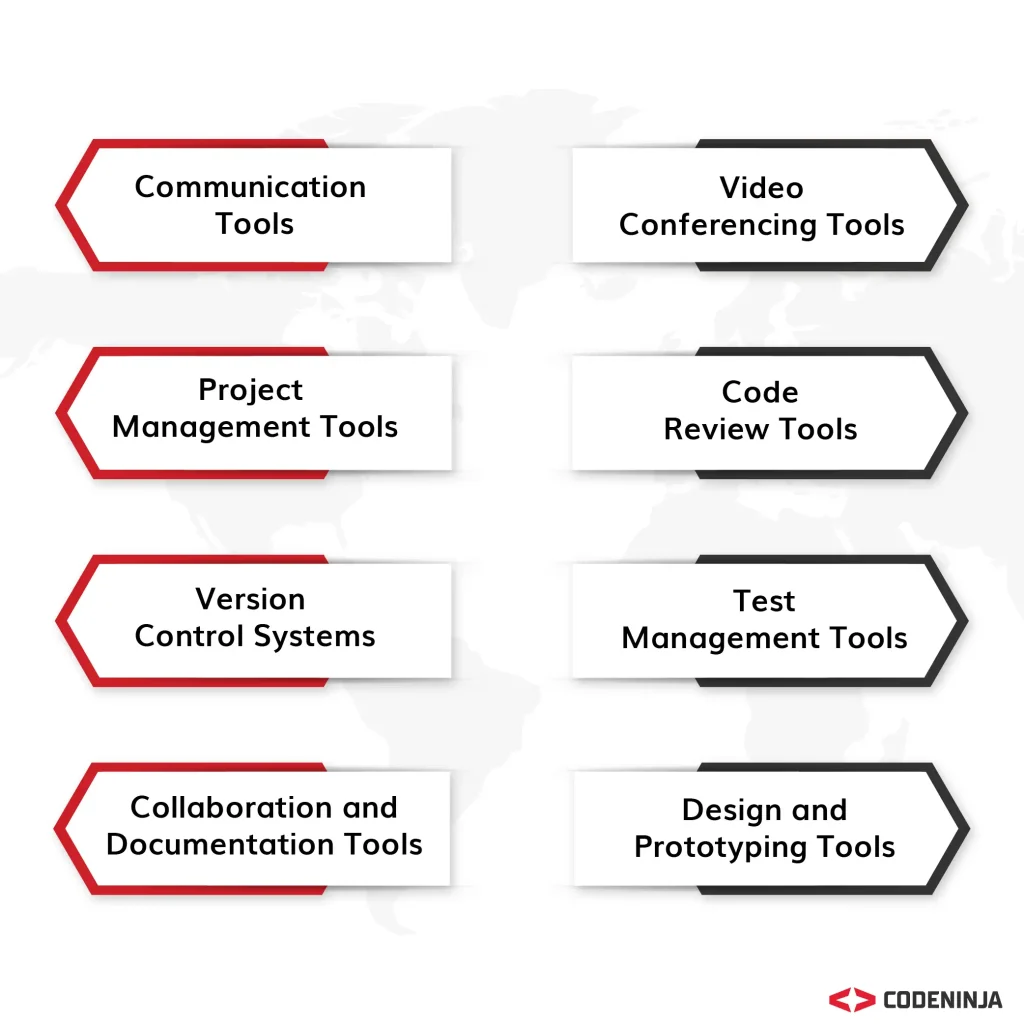
Conclusion
In conclusion, when looking to hire an offshore software development team it is important to keep in mind the various factors involved and research those carefully.
Take into account your specific requirements, budget constraints, and project timeline before making any decisions.
By considering the above guidelines while searching for a reliable vendor, you will be able to easily find an offshore software development team that suits your needs perfectly and helps take your business to new heights.
.jpg&w=256&q=75)
Zobaria Asma
Asst. Manager Brand & Communications
Zobaria serves as the Asst. Manager Brand & Communications at CodeNinja, driving brand strategy and communication efforts across diverse global markets, including APAC, LATAM, and MENA. With over 5 years of experience in scaling businesses, she brings expertise in SaaS branding and positioning. Her expertise spans a range of sectors, ensuring that CodeNinja's messaging resonates with diverse audiences while reinforcing its leadership in hybrid intelligence, AI-driven innovation, and digital transformation.
